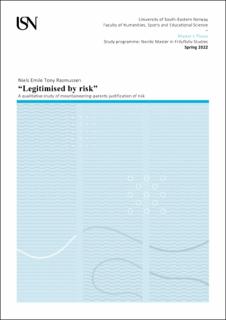“Legitimised by risk” - A qualitative study of mountaineering-parents justification of risk
Abstract
This master’s thesis sought to explore the personal justifications of parents in high-risk mountain-based jobs, the factors that influence this justification, and whether risk willingness changes when becoming a parent. Five qualitative semi structured interviews of professional guides certified through IFMGA - three males and two females, - were analysed using the method of emerging themes. Through a theoretical framework encompassing Bourdieu’s theory and concepts of social practice, parts of the social foundation behind the informants’ justifications were uncovered. The findings enlighten the effect of being socialised into the mountain guide community, beginning during the education process, and involving the incorporation of the social norms and thought patterns, along with the internalisation of a specific risk perception and significant acceptance. Key factors that influence the actors’ personal risk justification were highlighted. Traditional social norms, biological factors, identity, education and experience, cred leading to multiple forms of capital, experience of close calls, and partners - both in life and in mountaineering, all influenced the way they justified having an inherently risky job. Justifying this risk was not difficult because the informants simply found that it was not that risky. They argued that risk is in large part subjective and to them, highly educated and experienced guides, the inherent risk of mountain guiding in Norway was acceptable. A decrease in risk willingness was concomitant, though somewhat delayed, to having kids, but was not dissociable from aging, and primarily effected the informants’ private practices, as the work-associated risk was considered limited.
